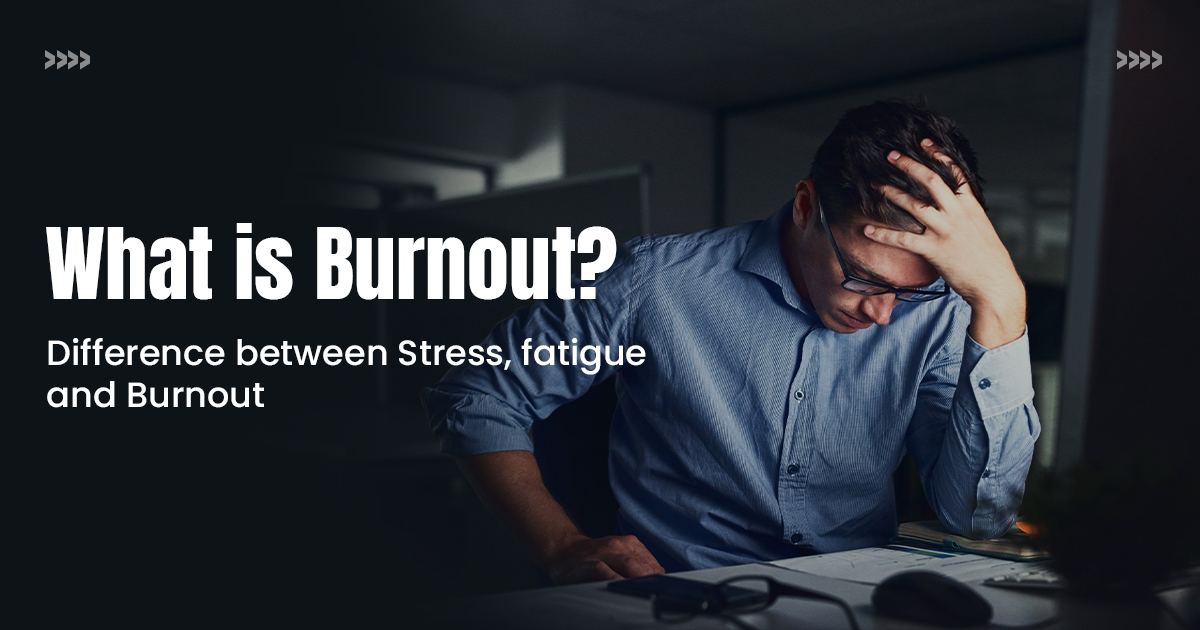
What is Burnout? Difference between Stress and Burnout
With work days being so stressful, people are more likely to experience burnout and they often mistake stress, fatigue, and burnout for one another. However, stress, burnout and fatigue are entirely different phenomena. Burnout might give you a gloomy feeling and a pessimistic attitude in life, and it may even cause you to question your skills and accomplishments.
Defining burnout
Burnout is characterised by extreme exhaustion on all fronts, including mental, emotional, and physical, brought on by prolonged high levels of stress. It happens when you feel emotionally spent, overburdened, and unable to keep up with the demands of work and personal life. It is a term used to describe tiredness on a physical, emotional, or mental level accompanied by low motivation, poor performance, and bad attitude toward oneself and others.
Burnout may be exclusively linked to one's job, or it may indicate underlying depression. It is the state of being overworked, working too much, too hard, or too long can lead to burnout.
Differentiating stress, fatigue and burnout
Although stress, fatigue and burnout are alike, they are not the same thing at all:Duration:
Stress is often momentary and goes away when the situation is rectified, or the stressor is eliminated. Fatigue can last for several days and sometimes a year or more. Burnout is a chronic form of tiredness that endures even after the source of stress has been eliminated.Emotional reaction:
Stress can induce feelings of anxiety and irritation. Fatigue increases negative reactions and decreases positive ones. Emotions of detachment, cynicism, and indifference frequently accompany burnout. Burnout can leave a person emotionally spent and unable to feel happy or fulfilled.Physical signs:
Stress can induce headaches, tense muscles, and digestive issues. Chronic tiredness, sleepiness or lack of energy, headache, dizziness, etc., are a few signs of fatigue. However, burnout can bring on more severe physical problems, such as reduced immunity, persistent weariness, and cardiovascular illness.Causes:
Stress generally occurs due to external pressure like work, financial issues, etc. Lifestyle, poor sleeping habits, etc can cause fatigue. On the other hand, long-term stressor exposure without a support structure in place leads to burnout.
Symptoms:
Stress symptoms can be physical, emotional or behavioural. Fatigue symptoms include headache, muscle weakness, etc. But along with stress symptoms, burnout symptoms tend to be more severe and persistent.Impact:
Stress can negatively impact performance and well-being—fatigue results in slower reactions, memory lapse, etc. In contrast, the effects of burnout can be more severe, including depression, anxiety disorders, and even physical health problems.Management:
Stress management focuses on identifying stressors to lessen the negative effects of stress on general well-being, creating coping mechanisms, and implementing self-care routines. Fatigue can be managed by having a proper breakfast, consuming caffeine with care, drinking plenty of water, etc. Burnout recovery calls for a more all-encompassing strategy that considers the needs of one's physical, emotional, and mental health in addition to implementing long-lasting adjustments to one's way of life, work-life balance, and self-care practices.Treating stress
- Exercise
- Relax your muscles
- Deep breathing
- Eat well
- Slow down
- Take a break
- Make time for hobbies
- Talk about your problems
Treating fatigue
- Having proper sleep
- Reduce stress
- Cut off caffeine
- Balance your nutrient intake
- Meditation can help
Treating burnout
- Exercising frequently, maintaining a healthy diet, getting enough sleep, and engaging in self-compassion exercises
- Engaging in entertaining activities
- Asking friends, family, and co-workers for social support
- Being conscious of one's mentality
- Being receptive to differing viewpoints
- Recognising and controlling pressures at work
- Enhancing coping mechanisms like communication and problem-solving techniques, making sure that job expectations are realistic
For those who are experiencing stress, the following could be helpful:
For those who are experiencing fatigue, the following could be helpful:
For those who are experiencing burnout, the following could be helpful:
Stress, fatigue and burnout prevent you from working productively. Stressed-out individuals can still believe they would feel better if they could control everything. In fatigue, a person feels demotivated and has no energy. Conversely, burnout is about not having enough. Burnout is when one feels empty, psychologically spent, demotivated, and beyond caring. If you feel that you are suffering from either, feel free to connect with our Resilience program and get access to our evidence-based strategies with a high-tech and high-touch approach that can help you in managing it better.